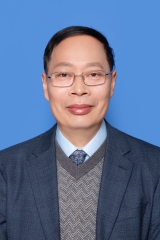 | Zhongsheng Hou IEEE Fellow Qingdao University, China Biography: Zhongsheng Hou (IEEE Fellow, 2020) received the B.S. and M.S. degrees from the Jilin University of Technology, Jilin, China, in 1983 and 1988, respectively, and the Ph.D. degree from Northeastern University, Shenyang, China, in 1994. From 1995 to 1997, he was a Postdoctoral Fellow with the Harbin Institute of Technology, Harbin, China. From 2002 to 2003, he was a visiting scholar with Yale University, CT, USA. From 1997 to 2018, he was with Beijing Jiaotong University, Beijing, China, where he was a Distinguished Professor and the Founding Director of the Advanced Control Systems Laboratory, and the Head of the Department of Automatic Control. He is currently a Chair Professor and head of the Academy of Sciences Science and Control, Qingdao University, China. |
| Jinde Cao IEEE Fellow Southeast University, China Biography: Jinde Cao is an Endowed Chair Professor, the Dean of Science Department at Southeast University (SEU). He is also the Director of National Center for Applied Mathematics at SEU-Jiangsu of China and Jiangsu Provincial Key Laboratory of Networked Collective Intelligence of China. He is also Honorable Professor of Institute of Mathematics and Mathematical Modeling, Almaty, Kazakhstan.He was a recipient of the National Innovation Award of China, Jiangsu Province May 1 Labor Medal, IETI Annual Scientific Award, Obada Prize and the Highly Cited Researcher Award in Engineering, Computer Science, and Mathematics by Clarivate Analytics. He is elected as a fellow of IEEE, a member of Russian Academy of Sciences, a member of the Academia Europaea, a member of Russian Academy of Engineering, a member of the European Academy of Sciences and Arts, a member of the Lithuanian Academy of Sciences, a fellow of African Academy of Sciences, and a fellow of Pakistan Academy of Sciences. |
 | Long Cheng IEEE Fellow, IET Fellow, AAIA Fellow University of Chinese Academy of Sciences, China Biography: Long Cheng, Researcher at the Institute of Automation, Chinese Academy of Sciences, Professor at the University of Chinese Academy of Sciences, and PhD supervisor. IEEE/IET Fellow. His main research interests include dexterous robot manipulation and imitation learning, embodied intelligence, tactile and force perception and multimodal large models, physical human-robot interaction, and intelligent wearable technologies. Currently appointed as Chair of the IEEE CIS Beijing Chapter, he also serves as Deputy Director of the Technical Committee on Robot, Chinese Association of Automation, Joint Member of the Technical Committee on Control Theory, Chinese Association of Automation, Joint Member of the Cognitive Intelligent Automation, Chinese Association of Automation, Deputy Director of the Technical Committee on Network Science and Engineering and Deputy Director of the Technical Committee on Intelligent Command and Control Systems Engineering, Deputy Director of the Intelligent Vehicles and Robotics Subcommittee of the Analytical Instrument Branch of China Instrument and Control Society, and Vice Chairman of the Beijing Association for Artificial Intelligence. He is an editorial board member of several domestic and international journals, including IEEE/ASME Transactions on Mechatronics, IEEE Transactions on Cybernetics, Science China Information Sciences, and Science China Technological Sciences. He has been awarded the National Science Fund for Distinguished Young Scholars and the Beijing Distinguished Youth Fund. He received the Second Prize of the National Natural Science Award in 2017. |
 | Jian Sun National Leading Talent Beijing Institute of Technology, China Biography: Jian Sun, Professor and Dean of the School of Automation at Beijing Institute of Technology, and Executive Deputy Director of the State Key Lab of Autonumous Intelligent Unmanned Systems. His main research areas include autonomous intelligent unmanned systems, networked systems, and control system security. He has published over 180 academic papers in journals such as IEEE Transactions and Automatica, and authored 2 academic monographs. He has received one Second Prize of the National Natural Science Award, two First Prizes of the Ministry of Education Natural Science Award, and two Second Prizes of the National Defense Science and Technology Progress Award. In 2019, he was awarded the National Science Fund for Distinguished Young Scholars. He currently serves as a member of the 8th Science and Technology Committee of the Ministry of Education, Deputy Director of the Technical Committee on Control Theory, Chinese Association of Automation, Deputy Director of the Industrial Control System Information Security, Chinese Association of Automation, Deputy Director of the Technical Committee on Swarm Intelligence and Cooperative Control, and Deputy Director of the Technical Committee on Network Science and Engineering. He is also an editorial board member of journals including IEEE/ASME Transactions on Mechatronics, IEEE Transactions on Systems, Man, and Cybernetics: Systems, Science China Information Sciences, Journal of Systems Science and Complexity, Acta Automatica Sinica, and Acta Electronica Sinica. |
 | Jian Cao IEEE Senior Member Shanghai Jiao Tong University, China Biography: Jian Cao is a tenured professor and PhD supervisor at Shanghai Jiao Tong University. His main research interests include business process management, intelligent data analysis, service computing and distributed artificial intelligence. He has presided over a number of research projects, including key programs of the National Key R&D Program of China, projects of the National High-tech R&D Program (863 Program), projects of the National Natural Science Foundation of China, and key projects of the Shanghai Municipal Science and Technology Commission. He has received nine provincial and ministerial-level science and technology progress awards, including Special Class, First Class and Second Class honors, and was selected into the Program for New Century Excellent Talents of the Ministry of Education. His research achievements have been applied in industries such as finance, healthcare and tourism. He has published more than 300 academic papers at home and abroad. Currently, he is a Senior Member of IEEE, a Distinguished Member of China Computer Federation (CCF), Director of the Special Committee on Collaborative Computing and Information Services of Shanghai Computer Society, and Deputy Director of the Special Committee on Trusted Intelligent Systems of Shanghai Artificial Intelligence Society. |
 | Chengxin Zhang Shenzhen Institutes of Advanced Technology, Chinese Academy of Sciences, China Biography: Dr. Chengxin Zhang is a Principal Investigator at the Shenzhen Institutes of Advanced Technology, Chinese Academy of Sciences. Previously, he served as a Research Assistant Professor at the University of Michigan and as a Postdoctoral Fellow at Yale University. He has authored more than 60 peer-reviewed SCI-indexed publications, earning an h-index of 34 and accumulating over 6,600 citations. His work as first or corresponding author has appeared in prestigious journals such as Nature Methods and Nature Protocols. Dr. Zhang has developed several open-source software tools that have achieved top rankings in community-wide benchmarks, including the Critical Assessment of Structure Prediction (CASP) and the Critical Assessment of Function Annotation (CAFA) challenges. |
INVITING AND UPDATING*

